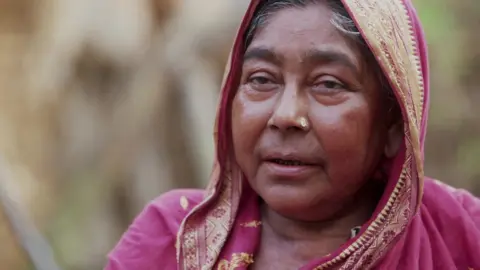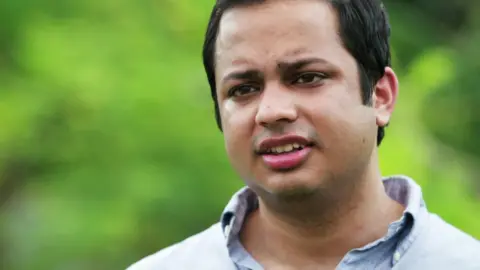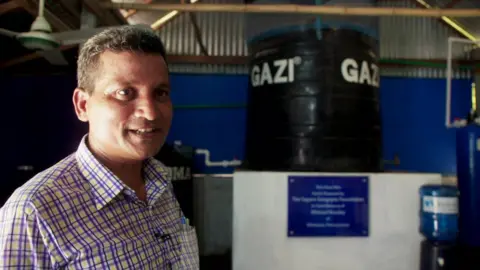Can these beads stop 'history's biggest mass poisoning'?
The beads of resin may not look like much but they could save hundreds of thousands of at-risk people in Bangladesh and parts of India.
Human Rights Watch says up to 20 million people are at risk from arsenic poisoning in Bangladesh.
Millions have already suffered from what the World Health Organisation calls "the biggest mass poisoning in human history".
Millions of "tube-wells" have been dug across Bangladesh since the 1940s. The simple pumps were rolled out across the country by the government and NGOs from the 1970s onwards as a way of delivering cost-effective bacteria-free water.
However during the 1980s cases of arsenic poisoning began to emerge.
Arsenic can not be seen or smelt; the first signs of its impact are skin lesions which only emerge once the poisoning has taken place.
The poisoning can set off a range of heart diseases and cancer and the external symptoms look a lot like leprosy, which can lead to victims and their families being shunned by the local community.
A heavy price

Siaton Nessa Meherpur has lesions on her skin from arsenic poisoning. She's in her mid-50s and she says the disease has blighted her entire family.
"Because of this well my whole skin is filled with black patches," she says.
"I am worried about my children because no one is prepared to marry them."
While the government has made efforts to replace the wells, in many rural areas they are still the primary source of water especially as many families have dug their own tube wells.
Human Rights Watch estimate 43,000 people die each year in Bangladesh from illnesses caused by arsenic poisoning.
New solutions

Minhaj Chowdhury, 28, was raised in the United States but visited family in Bangladesh during school holidays.
"It shocked and deeply saddened me to think how we never had to worry about water being fatal in the US but here in Bangladesh one in every five deaths was associated with unsafe drinking water," Mr Chowdhury says.
After his grandfather died due to a disease linked to water he decided to take action.


The BBC's Innovators series reveals innovative solutions to major challenges across South Asia.
Ever heard of the concept of "jugaad"? It's a Hindi term meaning cheap innovation.
If you have created a life hack or innovation that you are proud of, or spotted one while out and about on your travels, then share your picture with us by emailing [email protected], use the hashtags #Jugaad and #BBCInnovators and share your picture with @BBCWorldService, or upload your submission here.
Learn more about BBC Innovators.

In 2013 he founded Drinkwell, in partnership with Dr Arup K SenGupta who invented a particular type of resin technology and had already been active in implementing it in India.
The resin removes arsenic and other harmful substances from water and once it has been used Drinkwell filters the water through a series of other tanks to take out other harmful substances.
The water is sold locally by "Drinkwell" entrepreneurs and the money raised is used to maintain the system.
The pricing is set depending on location but a monthly subscription costs anywhere between $0.05 (4p) and $0.12 for 20 litres (4.4 gallons) a day.
Entrepreneurial opportunity
According to the United Nations, 30% to 50% of all water projects fail after huge investments because of a failure to maintain the facilities.

Dr Khairul Islam, the country director for the charity Water Aid in Bangladesh' believes that social entrepreneurs have a role to play in tackling the arsenic poisoning.
Dr Islam told the BBC that the main problem so far has been operation and maintenance.
Because Drinkwell includes operational and maintenance costs at the centre of its model he says it is the kind of model "this country needs".
The first Drinkwell plant began dispensing water in the Manikganj district in 2015. Today that one plant alone has 750 daily customers and dispenses 150,000 litres a day.
The network has grown across the country, often by going into schools to deliver safe drinking water for students' meals, from there the word spreads across communities.
There are now 30 Drinkwell filtration plants in India and Bangladesh serving more than 100,000 people.
Mr Chowdhury believes this is just the start for Drinkwell. He hopes to eventually reach hundreds of millions of people across Asia.
He is already talking to the Bangladesh government about rolling out the technology across the country.
By involving the communities in the maintenance through their entrepreneur network Mr Chowdhury believes the system can provide clean water "forever".
